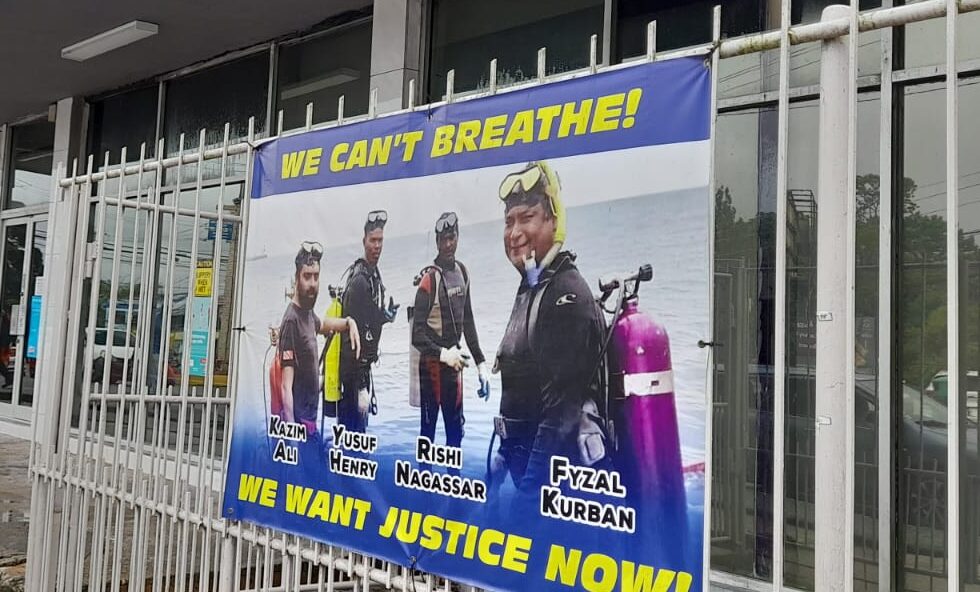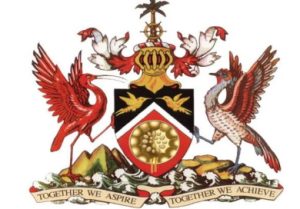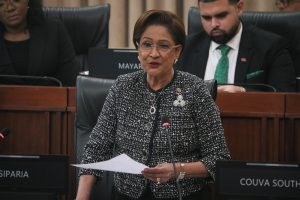By Sue-Ann Wayow
PARIA Fuel Trading Company was more concerned with the safety of others than those trapped inside the pipeline begging to be rescued on February 25, 2022.
This was the point driven by attorney representing Fyzal Kurban and Yusuf Henry, Prakash Ramadhar during the Commission of Enquiry (CoE) third day of evidential hearing into the circumstances that caused Kurban, Henry, Kazim Ali Jr and Rishi Nagassar to die tragically while performing their duties.
Ramadhar had to be cautioned by CoE’s chair Jerome Lynch, KC, on several occasions as he fired question after question at Paria’s technical maintenance manager Michael Wei, a member of the ICT team responsible for any major incidents on the site or emergencies.
Wei who spent hours in the witness box on Thursday, maintained that risk assessments needed to be done before sending anyone into the pipeline to rescue the divers.
However, Ramadhar argued that if Paria ever considered that persons were willing to risk their lives to save the four men before they died given that Wei’s opinion was that the men died sometime three days after they disappeared.
In his line of questioning, Ramadhar asked what efforts were made to actually send someone into the pipeline to rescue the men, apart from the risk assessment conducted.
Click on links to read AZP News coverage of the Commission of Enquiry:
Hear harrowing last words of the four divers
Read what role Delta P played in tragedy
Paria Stops its Staff from being interviewed for Enquiry
Commissioners see where divers died
Hyperbaric Chamber to be lifted from ocean floor
Paria took 4 hours to talk to Boodram
Ramadhar told Wei, “That never occurred.”
He asked, “You think it was a bureaucratic exercise you were in or a lifesaving effort?”
Wei agreed that it was a life-saving effort that he was involved in.
Wei said, “The efforts were to establish the safety inside the line, without putting other people’s lives at risk.”
Wei replied, “The principles of rescue are not to put other people’s lives at risk, it would have been a whole different scenario had Michael (Kurban) gone in, you cannot send someone into the line with unsafe conditions and you end up with a different situation.”
Ramadhar: “You were concerned more about the other persons lives who going to rescue, is that what you are telling us? That is part of the factors?
Wei said, “Part of the factors. You cannot send someone into the line that is unsafe and then you end up with a different situation.”
Ramadhar, “And the situation that we ended up was what, four dead men. Is that it? No effort made to save them, is that accurate?”
It was that point that Wei gave an example of a burning house.
“It is like someone running into a building that is burning and is falling, to run into that building that is burning and falling to save some-one you are putting yourself at risk where you yourself might die.”
Lynch interjected agreeing with Wei.
“Of course that is right.”
However, he also asked, “If that was your father would you?”
Wei paused.
Lynch then said, “You don’t have to answer that question.”
He allowed Ramadhar to proceed with his questioning.
Paria did not want to risk another life
Earlier, Wei was grilled by senior counsel to the Commission Ramesh Lawrence Maharaj on the risk assessment conducted at the time of the incident.
Lynch stepped in several times to ask additional questions of Wei.
Wei said Paria was initially advised by expert divers that it was “too risky” to venture into the pipeline and more information was needed. He also maintained that Paria was not equipped for diving purposes and that LMCS, the subcontractor with whom the men were employed would have the necessary diving equipment and personnel to conduct a rescue.

Without all information at that time, Wei said, “Putting someone inside that line without knowing the conditions in the line is wonton recklessness.”
When asked by Maharaj if LMCS divers onsite were prevented from entering the pipeline, Wei replied “Paria would have advised that it was unsafe to enter.”
Further down in the questioning, Lynch asked Wei, “Were you aware that those who were missing were related to divers who were on the surface and who had worked or were working with LMCS?”
Wei responded yes.
“There was a father, a cousin I think or a brother or another, were you aware of that?”
Lynch further asked, “And perhaps relatives will be more likely to take risks to retrieve their own relatives than a stranger”
There was another yes from Wei.
When asked by Lynch if that factor was taken into consideration in the risk assessment, Wei replied, “Yes it did.”
![]()















